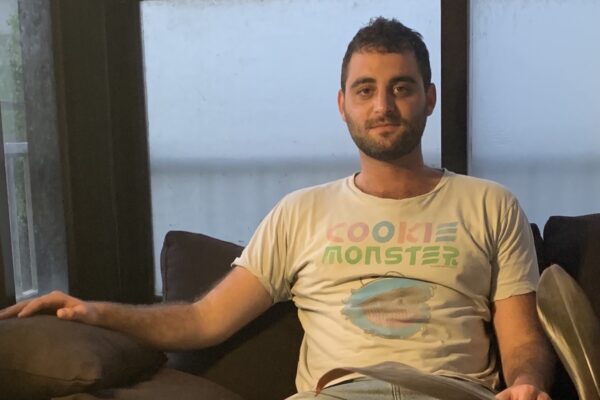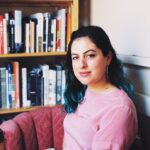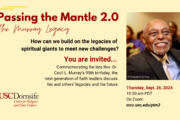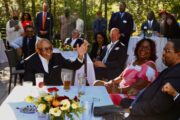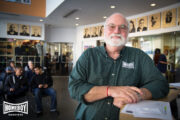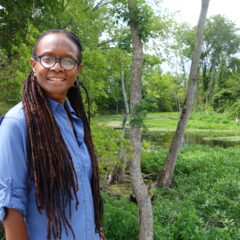This radio documentary was produced by KALW’s The Spiritual Edge, with the support of CRCC’s global project on engaged spirituality.
To hear this and other profiles, subscribe to The Spiritual Edge podcast in your favorite podcasting app, such as Apple podcasts, Spotify or Google Podcasts. Find out more on The Spiritual Edge website.
A version of this story also ran on The World.
Michael* wears small round glasses. He has bushy brown hair and bright eyes.
The night I visited his Tel Aviv apartment, he opened the door for me barefoot, in cutoff denim shorts and a thin t-shirt with a picture of Cookie Monster on the front. He was on the phone, working.
Michael is the 27-year-old spokesperson for a member of Israel’s parliament. His phone dings pretty much constantly with notifications.
We sit at Michael’s kitchen table drinking cups of soda water. He rolls a cigarette as he tells me his take on Judaism.
“The best story that I learned from Judaism is actually … it’s not in the actual Bible. It’s when Abraham is supposed to leave everything,” he tells me. “And what he does in this story is that he stands up and the first thing he does is he smashes his father’s idols, and then he goes out for his own journey.
I mean any religion that starts the journey like this … the forefather of Judaism stands up and smashes the idols …That’s the kind of religion that I can subscribe to and identify with,” Michael says.
The stories Michael heard growing up in Jerusalem about his own family had the same mythic tone as those he heard about biblical ancestors like Abraham, the founding father of Judaism. About his grandparents who fled European antisemitism for Palestine, before the state of Israel was established in 1948. His grandfather fled from Uzbekistan. He fought in an underground militia to help create a Jewish state that would protect Jews from persecution.
“So you have one grandpa who was like, this freedom fighter (against) the colonialist power,” Michael says. “And then my dad was in the foreign service.”
He’s talking about the Israeli foreign service.
“It was very clear to us that we were part of this place … and like, this is our place.”
He was ready to fight for it too.
“The Israeli anthem used to get me extremely excited. Goosebumps excited. This is my home excited,” Michael says.
When he was growing up, he felt an almost gravitational desire to build and protect the Jewish state.
“My Jewish identity was based completely around nationalism, my Jewish nationalism,” Michael says. “I wasn’t religious. I had Zionism. I wasn’t orthodox. I wasn’t secular. I was a Zionist.”
Most Israelis have to enter the state defense forces at age 18. Right after high school, Michael joined an elite unit. He trained during his first year. Practicing hand-to-hand combat and using weapons. Learning army Arabic and expressions like: ‘Stop or I’ll shoot,’ ‘take your shirt off,’ ‘turn around,’ ‘take your pants off,’ ‘give me the keys to your car,’ ‘turn the car off,’ ‘turn the lights on,’ ‘turn the lights off,’ ‘men to the right, women to the left.’
The higher-ups chose him to become a commander.
“I was like, I’ve won the lottery,” Michael says. “This is the best. This is exactly what I wanted.”
Michael’s first assignments were in the West Bank, which are the Palestinian territories Israel has occupied since 1967. He and his troops raided villages, patrolled streets, and made arrests.
“There was this one time where one of my officers is driving outside of the village, and he tells us to open up the doors of the armored vehicle … And then he gives us a box of flashbang grenades and he tells us to start throwing them into the village in the middle of the night.”
“He says, ‘So they know who owns this place.’ And flash, bang — grenades are like fireworks. We woke up the whole village.
One day, Michael and his soldiers caught some guys throwing stones in the Palestinian city of Hebron, which is surrounded by Israeli settlements. When the soldiers went to arrest the guys, one of them gave Michael a hard time.
“I pointed to my gun and I said, ‘Don’t make me do something I don’t want to do,’” he says.
With his knee, Michael battered the man in his chest and face. “Until he was half passed out and bloody,” Michael says. “I don’t remember if he screamed. I don’t remember if he cried. I don’t remember if he was silent. I just remember it worked.”
Michael grabbed the bleeding man by the back of his neck and put his hands behind his back to cuff him.
“I was smiling,” Michael says. “We’re all happy. We got some action. We did what we had to.”
That summer, Israel declared war on the Gaza strip, a Palestinian-governed resource-poor piece of land on the Mediterranean Sea. The Israeli Army would be sending Michael’s troops there to find and destroy underground Hamas tunnels.
“Gaza is like the Hornet’s Nest,” Michael says. “That’s what it’s called in Hebrew. It’s like it’s out of charted territory.”
In the middle of the night, Michael led his men into Gaza through fences. When the sun rose, he saw chaos.
“No one knows where everyone’s standing and you almost shoot people from your company because they’re standing in the wrong place,” says Michael. “It’s a mess.”
Bulldozers were ripping up houses and farmland.
“There are a lot of — just dead animals stuck under the debris and it smelled horrible. Dead farm animals. Cows. Camels. Donkeys. Chickens. That was a smell that you don’t forget.”
The war killed some 2,200 Palestinians and 70 Israelis. But Michael, he got to go home.
“My parents were scared,” Michael says. “They had no idea what to do. They literally warmed up a schnitzel and then they cut it for me as if I was six years old. And they were talking quietly, like, ‘Michael, is everything okay? Do you want some ketchup?’”
Michael ate his schnitzel and took a shower. Days passed. He slept a lot. He read a lot.
“Well, the more time that went past, the more I felt the dissonance between me supposed to be feeling like I’m a hero because I was one of the soldiers that was inside — and the incredible guilt,” Michael says.
“Our housekeeper was Palestinian. She had a son named Tarek who was in administrative detention. The accusation was throwing stones in East Jerusalem. So my mom and Tarek’s mom, our housekeeper, Majda, they get together and cry. And, where are our sons and what is happening here?”
After Michael’s mom told him this story, she called up their housekeeper, Majda. She invited Michael over for dinner to meet her son, Tarek.
“I was excited,” Michael says. “And also it seemed like an adventure now. It’s two kilometers away driving. But it’s like a distance I never traveled for 24 years.”
“I meet Tarek. We go to the neighborhood vegetable store. We sit down for dinner. There are mixed feelings about me being there. There are some people who are less comfortable with me being there.
It was a beautiful dinner and … I was sitting right in front of the door,” Michael says. “I’m asking someone to pass me the rice, and we’re eating, and then I take a look at the door. And I realized that this is exactly what was happening right before every single time I barged in through a Palestinian door in the middle of their dinner, or in the middle of the night. It’s just people’s lives being people’s lives.”
“Nothing made sense anymore,” he said.
Michael didn’t talk about it much, except with a close friend. One day over a beer, that friend invited Michael to a lecture by a Palestinian named Bassam Aramin.
“He has this amazing story of how he’d come to terms with non-violence,” Michael says. One day his daughter was walking home from school. She was around six years old and she was shot in the head by a border police officer and killed.”
Bassem was talking to Israeli students in an auditorium.
Michael says, “He’s telling his story and one of the kids raises his hands and he asks, ‘Why is it that an Israeli soldier would shoot a kid in the head?’ And then from the back of the room? I raise my hand.”
Bassem called on Michael to speak. Michael wasn’t sure where he was going when he started talking to the room, but soon he was talking about his own experience as a soldier.
“We were in a checkpoint one time and one of my sergeants told a soldier to shoot a rubber bullet, which instead of hitting the kid in the leg, hit him in the chest,” Michael says. “While I was telling that story my voice is shaking and Bassam, what Bassam does is that he walks over to me while my voice is shaking with a glass of water, and he gives it to me.”
“I think that I’ve never been worthy of so much compassion,” Michael says. “But the fact that he did that and then spoke to me after the lecture and he asked me about my background and what’s going on. And he goes, ‘One day you’ll join Combatants for Peace and you’ll be an activist like Bassam.’ I said, ‘I don’t think so, Bassam.’”
Weeks later, Michael met with the group Bassam had talked about, Combatants for Peace. It’s a group of Palestinians and Israelis who had taken an active role in violence and now work together to talk and promote non-violence in the region. Michael recalls his first meeting with Palestinians in this context.
“I kept looking at their pockets … I was always trying to look at people’s pockets to see if they’re going to pull out a knife or something.”
But at those meetings, Michael really listened to Palestinians tell their stories. And for the first time, he was realizing that there were worlds of stories beyond the ones he’d grown up hearing about the heroic fight for a Jewish state.
“And I felt like the ground was just pulled out (from) under my leg,” he says. “Because my whole perception of reality, everything that I was taught to think about what was happening here, had nothing to do with what was actually happening.”
Michael’s religion had been orbiting around nationalism. But the more he learned from Palestinians, the more holes he found in his steadfast faith in the noble and moral struggle for a Jewish homeland.
“So, if I thought that I was going into the army to be my grandfather, the freedom fighter who was fighting the British soldiers — and I found that I was like the British soldier. That’s hard to deal with, especially when again you’re raised in a certain society where the way you place yourself in the universe is through that national story, through that ideology, through those values.”
So if Michael no longer believed in taking up arms for the state of Israel … what did he really have?
“And suddenly you don’t know where you’re supposed to be or who you are exactly or what story you’re telling yourself anymore,” he says.
Eventually, Michael met other veterans asking similar questions through an Israeli group called Breaking the Silence. The veterans share their stories from their time in the military.
“Breaking the Silence, it’s like an idiom. It’s just like a code word where you don’t even have to add anything more. Politicians will just throw it out there like, ‘Oh you, and Breaking the Silence.’ And enough said. So yeah, people know what it is.”
And a lot of people really don’t like it. Including a lot of people in the government. There’s a law called the ‘Breaking the Silence’ law that bans the group from speaking in public high schools.
“Literally, the only message of the group is: This is what we did, it’s wrong,” says Michael. “And I think that it’s so controversial because it cuts straight to the core of our denial.”
“He gave this excellent interview,” says Avener Gaveryahu, the executive director of Breaking the Silence. “And I was like, you know, who is this kid? Where did he come from?”
When he heard Michael speaking to the press about his own testimony, Avner asked him to be the spokesperson for Breaking the Silence.
“And that was sort of a bold move. He didn’t have a lot of experience, but I think that… it was very clear that this kid is going to do great things,” Avner says.
About half a year into the job, Michael was out with friends in Jerusalem. They were headed to a bar when Michael pulled out his phone and clicked on a Facebook notification.
“I was tagged on Facebook,” says Michael. “And I see this video.”
The video shows Michael in front of a larger group, describing the day he beat unconscious the young Palestinian man who was resisting arrest on the accusation of throwing stones.
And then, a man with a scruffy beard and fade haircut with the title ‘team commander’ comes on the screen and says, in Hebrew: “It never happened.”
Another guy, with the title ‘fighter to the company’ says: “Where did you come up with this stuff?”
And then, one by one, twelve soldiers look straight into the camera.
One says: “Michael, I was your crew commander and you’re a liar.”
Another: “Michael, I was your soldier, and you’re a liar.”
“Michael, I saw your testimony and you’re a liar.”
“Micahel, I was a fighter in your unit and you’re a liar.”
“And it’s one after another, and another one, and another one, and another one,” says Michael.
I asked him if these were guys he knew.
“Some of these guys followed me into Gaza,” he answers. “Some of these guys were guys that I was shot at with. I’ve been to some of their houses. I’ve spoken to their parents. Yeah, I thought we were close … and the video is them calling me a liar. And then it ends with some text saying, ‘You’re either a liar or a criminal.’”
Within 24 hours the video reached radio and TV stations.
“It was everywhere,” says Michael. “It got to the news. It was big. The internet doesn’t stop. People are like writing posts and it’s becoming viral. And suddenly like, the security minister comments on it. And then the justice minister says that I should be investigated.
A few days later, police called Michael in on suspicion of aggravated assault.
“A felony, which you can sit in jail for,” Michael says.
I ask: did he have the choice of taking back his testimony?
“Yeah,” he answers.
“My lawyer told me that you should just shut up and it will go away. Now, obviously, they thought that they’d investigate me, and I’d remain silent, and then they’d be able to say, ‘Well, he chickened out or he’s a liar.’”
If the country believed he was a liar, it would undermine Breaking the Silence and all of its veterans’ testimonies. But if Michael maintained that he did assault someone, that would make him a criminal.
Avner Gaveryahu, the Executive director of Breaking the Silence, didn’t really know what to do.
“I remember that I spoke to Michael, and he really wanted to respond,” says Avener. “It was very clear that this was personal for him … This was the beginning of something.”
In April 2017, Michael declared, in front of police investigators, that he assaulted a Palestinian man.
The investigators said Michael was lying and they wouldn’t put him on trial. Avner says it was a difficult moment for Breaking the Silence. “It’s decided by the authorities of the state that our spokesperson lied.”
But Michael says he and Avner quickly realized what they needed to do.
“What we have to do right now is the investigation which the police weren’t willing to do. We have to start collecting evidence, and trying to find witnesses and the victim, and prove that what I was talking about was the truth,” says Michael.
He had to prove that he had committed this crime.
When Michael saw the photo of the Palestinian man the investigators had questioned, he realized it was the wrong guy. But that wasn’t enough for the court to reopen the trial. Michael needed more evidence that he was telling the truth. He knew there was an Israeli human rights organization that gives cameras to Palestinians to document daily life in the territories. He gave them a range of dates and they combed through every piece of footage between those dates.
“And we get a phone call and I get rushed over to the lawyer’s office,” says Michael. “They open the computer.”
Michael and Avner and a few other members of Breaking the Silence huddled around a small screen.
“And we’re looking at it and it’s, it’s this unbelievable moment.”
“They show me the video of right after the arrest as we’re walking out of the alley,” says Michael. “And you just see this is the parade that I was talking about.”
He’s referring to the fact that after he beat up the guy, he paraded him through the streets with other soldiers and handcuffed Palestinian men. The video shows that.
“There’s me and another guy holding the guy that I kneed,” says Michael. “And I recognized him and he’s bruised in the face. My immediate response was that I broke out crying … I kept saying, ‘Sons of bitches. Sons of bitches.’”
With proof in hand, he got right to work. He called local journalists. And soon, the state attorney’s office reopened the investigation. One of Israel’s leading investigative journalism TV shows took up Michael’s story.
A few days before the TV show ran, the state attorney’s office released a statement admitting the mistake of interrogating the wrong Palestinian man.
“That’s huge,” says Michael. “It’s the state attorney’s office. It’s very powerful people with a lot to lose who did not want to admit their fault.”
“Did you ever find the right Palestinian?” I ask.
“Well, New Year’s Eve 2018, I’m about to go out to a party and I’m told that there’s going to be an interview with the guy who I actually beat up,” Michael answers.
Israeli TV journalists had found the right Palestinian man. His name is Faisal al-Natsheh.
“I was sitting there watching the news and they’re interviewing the guy’s mother,” says Michael.
“She’s talking about the trauma that her son went through. And they’re interviewing him, and … I had to look this guy in the eyes and hear his account of it and hear his mother talk about what I did to her son.”
“Did you ever interact with him or talk to him?” I ask.
“No,” he answers. “I don’t think he’d want to forgive me and I don’t want to ask him to.”
Before the state closed its investigation, Michael left his job representing Breaking the Silence. He went to work as the spokesperson for Ayman Odeh, who is leader of the third-largest bloc in Israel’s parliament. Odeh wants a shared future with the full and equal participation for the Arab Palestinians who live in Israel and who have citizenship. He also is calling for an end to the Israeli occupation and the establishment of an independent Palestinian state.
Michael works pretty much around the clock for Odeh.
As for his Judaism, ”It took me a very long time to realize that I can be Jewish without being a Zionist,” Michael says.
There’s this restaurant he goes to when he gets stressed or lonely. He orders the sour cherry soup with dumplings, a traditional dish belonging to Bukhari Jews, who are Jews with ancestors from Central Asian countries like Uzbekistan, where Michael’s grandparents came from. Eating it, he says, is his version of praying.
“Why do people pray?” Michael asks. “They just want to feel like they’re connecting to something that people have done before them. They want to feel at home. They want to feel something familiar. They want to feel less alone.
More than food connects Michael with his ancestors.
“I also feel like it’s very Jewish to fight apartheid, just like it was very Jewish to fight segregation,” he says.
“There’s something about Judaism which doesn’t naturally lend itself to supremacy. There’s something about Judaism which at its core is not materialistic. Because your God doesn’t have a name or a body or face, then you can’t worship land and you can’t worship flags and you can’t worship symbols. You can try and do good to other people.
Michael, with his public speaking and writing, his non-stop calls with journalists, and his political activism, he’s trying to do good for his people. For his country.
Click here to read or listen to the story on spiritualedge.org.
*Michael is a pseudonym.
Shaina Shealy is a journalist fellow with the Spiritual Exemplars Project.
